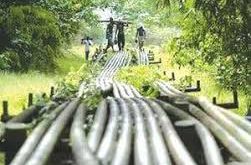By Joel Anekwe
The Department of Petroleum Resource (DPR) has restated its commitment to ensure the safety of tank farms across Nigeria, adding that it would not allow its safety strategy to be compromised by operators of tank farms in the country.
Mr Bassey Nkanga, zonal operations controller, Port Harcourt zone, made this known during a tour by the House of Representatives’ ad-hoc committee on relocation of tank farms from residential areas in Port Harcourt.
He said they would continue to make progressive improvement on the operational guidelines noting that; “DPR will continue to improve; we talk safety and safety is our watchword. The oil and gas industry knows that our vision on safety cannot be compromised.
“But in the event of lapses, we allow room for correction until required compliance level is met in terms of minimal safety requirements,” he said.
The DPR boss revealed that none of the tank farm operators within his jurisdiction was completely adamant to the safety regulations of the establishment.
“So far, what we saw today is quite commendable, the few lapses detected could be improved upon and I believe that affected companies will also make necessary improvements soon,” he said.
Mr Sergius Age, chairman of the ad-hoc committee said that there was need for collaboration amongst relevant agencies.
“When we started this task some months back, the various agencies were actually at each other’s throats, but today, there is a better cooperation amongst them. I believe that by the time we shall be presenting our reports, they will all be working in synergy.
Age added; “Our emphasis has always been on safety compliance, we look forward to having a breakdown on collaboration amongst relevant agencies such as the Federal Fire Service, the Nigeria Ports Authority, Federal Ministry of Environment, NIMASA and others.
“We are determined to also ensure that operating tank farms conform to operational guidelines of the DPR.
“From our findings today, one of the facilities we inspected, we saw about 24 storage tanks sited at close range, we observed issues with their offset that is too close.
“This simply means that all storage tanks are exposed to possible danger, if there is an incident of fire outbreak.
“And for others, the water sprinklers were not optimally functional and the hydrants were not also as forceful as we expected.
“Accidents do not just happen, it is caused. So for a peculiar facility like this, operators should be fully ready for optimal rescue in event of accidents.
“Some of these accidents can even occur after official hours, so there should be mechanisms to effectively manage such situation,” he added.
 PH Mundial – Port Harcourt Online Newspaper News Across The Region
PH Mundial – Port Harcourt Online Newspaper News Across The Region




